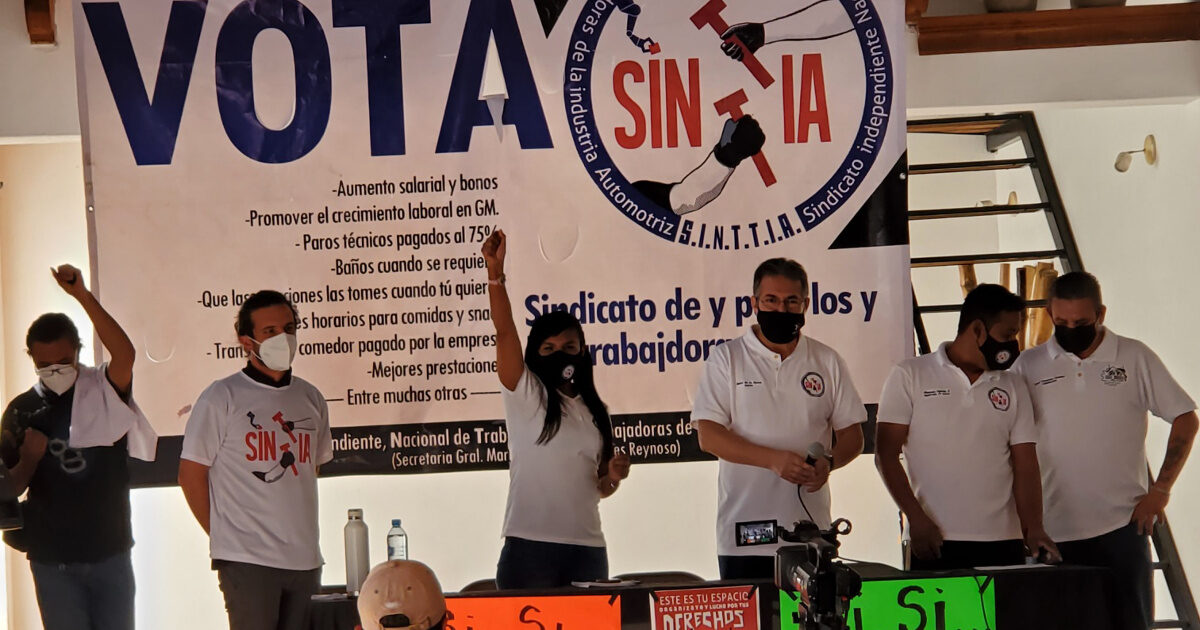In the early morning of Thursday, February 3, workers at a General Motors factory in Silao, Mexico, learned the results of a union election that was held at their plant earlier in the week: the independent union led by workers won by a wide margin. This is a huge victory not only for these workers, but for all Mexican workers who have been struggling to improve their labor laws for decades.
For more than two decades, the workers at this factory had been covered by a collective bargaining agreement under the union Confederation of Mexican Workers (CTM), but the workers received little benefit from this contract and had no rights to elect their leaders or to be involved in the contract negotiations. Their contract was known as a “protection contract” because it protected the company from having to negotiate with a real union. The CTM is one of many Mexican unions that cuts deals with employers, often before workers have been hired at a new facility. They are known as charro unions.
Under Mexican labor law reforms passed in 2019, this kind of corrupt union practice is no longer legal, and workers have a clear path for getting rid of these protection contracts. However the Silao factory is the first large plant to go through the whole process. That is one reason why this election is so important.
The independent workers’ union, known as SINTTIA (Sindicato Nacional de Trabajadoras y Trabajadores de la Industria Automotriz, or National Auto Workers Union), has been organizing at the shop since 2019. Last year, they moved forward with the first step in this process.
In order to get rid of the CTM, they had to hold a vote to dissolve their old contract. They did so in August. Under the new laws, the company had to keep all the terms of the contract in place until the workers had the opportunity to elect new representatives.
The union election was scheduled at the plant on February 1 and 2, but SINTTIA was not the only union on the ballot. In addition to the CTM, two other unions registered themselves: one that was known to have an affiliation with the CTM, and another that sprang up out of nowhere, but had a name similar to SINTTIA. Activists suspected they were added to the ballot to confuse the workers.
Leading up to the election, there were reports that the company and the CTM were trying to disrupt the secret ballot election. The company fired a union activist, and the CTM was trying to bribe workers to vote for them. However, during the election itself, independent observers were there to make sure things moved forward smoothly. These observers included UE allies from Unifor in Canada and the CUT in Brazil.
When the results were announced Thursday morning, SINTTIA leaders claimed a clear victory, receiving 4,192 votes of the 5,389 valid ballots cast, about 78 percent of the votes.
“The workers are fed up with the charro unions and seek to have freedom and democracy through another type of union,” said Eladio Abundiz Gaudian, a co-coordinator of UE’s Mexican ally Authentic Labor Front (FAT), who has addressed several UE conventions. “In this victory, it was a great job by all the national and international organizations that always showed their support for SINTTIA. I remain convinced that thanks to the 2019 labor reform and the impartiality of the labor authorities, there are great possibilities for other workers, women and men, to have labor justice. It is important at this time to publicize the changes to the labor law, through training workshops and forums.”
“I am excited to see this victory for an independent union in Mexico, especially one with an American employer,” said UE General President Carl Rosen. “UE has been a strong advocate for reform of Mexico’s labor laws so that workers have a say over their own working conditions. We cannot improve working conditions in the U.S. when corporations can run off to Mexico or another country to take advantage of workers who are forcibly denied basic labor rights. We look forward to SINTTIA putting forward a strong contract campaign to fight for the needs of the workers at this shop.”
Under the new labor laws, all Mexican union contracts will have to be voted on by secret ballot of the workers by May 1, 2023. The process in Silao will be an important example for workers across the country over the next year.
Photo: Unifor

